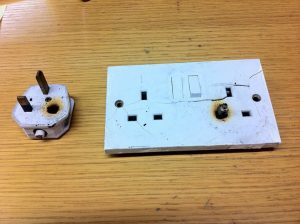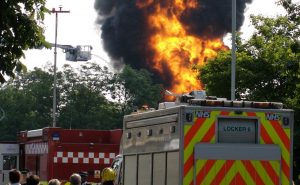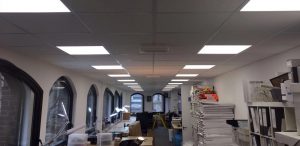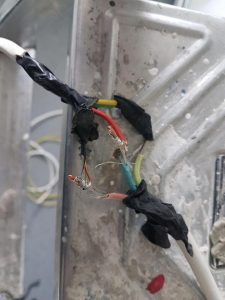Blog
Electrical Safety When Working From Home
Most of us wish we had the option to work from home in London and Hertfordshire from time to time, well I do anyway. The thought of being able to roll out of bed a little later, to have a leisurely breakfast, hey maybe cook myself some scrambled eggs on toast and then casually turn on my laptop in my PJ’s, all in the privacy of my own home sounds oh so great to me!
For those of you that do have that privilege of working at home, the team at Fulcher Edwards, your local, reliable and trustworthy Electricians in London and Hertfordshire, wondered how many homeworkers with electrical equipment provided by there employers, have some type of electrical maintenance in place or if there just left to get on with things? You know the ‘well it works’ attitude that some companies tend to suffer with unfortunately.
Although the home is the responsibility of the homeworker, they are only actually responsible for their own equipment which is purchased by themselves.
Employers should have steps in place like the ones below which are recommended by the HSE to keep their homeworkers safe and prevent harm or injury:
1) Check that plugs are not damaged
2) Check the domestic electrical systems are adequate for electrical equipment
3) Check plugs are correctly wired and maintained
4) Check that the outer covering of the cable or wire is gripped where it enters the plug or the equipment
5) Check that the outer corner of the equipment is not damaged, for example look for loose parts or screws
6) Check leads, wires or cables for damage to the outer covering
7) Check for burn marks or staining that suggests overheating
8) Repair electrical equipment that may cause harm or injury to the homeworker
9) Check that there are no trailing wires; if there are, tuck them out of the way,
for example under a desk or table to prevent accidents
The Health and Safety at Work Act 1974 (HSWA) places duties on employers, self-employed people and employees. Under this law employers have a duty to protect the health, safety and welfare of their employees, this also includes homeworkers. The safe use of electricity at work is covered by the Electricity At Work Regulations 1989.
Although homeworkers have a slightly different set up, their safety is equally as important as workers in an office environment and electrical maintenance needs to be in place regarding their equipment such as portable appliance testing. The type of maintenance procedures employers have in place will depend on whether hazards are low or high risk.
If you work from home then why not speak with your employer about what procedures are in place? As maintaining your electrical equipment is important for a number of reasons, mainly to avoid electrical faults as they can cause a fire.
If you are a homeworker in London or Hertfordshire, as professional electricians in London and Hertfordshire, we would love to hear what electrical safety procedures your employer has in place?
Give us a call now on: 020 7922 1101 / 01923 616985 or send us a message HERE
Dont Let Your Electricity Give You a Fright This Halloween

Halloween is the season to be scary and each year it is turning into a bigger event in this country, so why not get into the spirit of things by adding some spooky lighting to your own haunted house!
There is some great spooky figurines and lighting ideas to be found on the Internet in preparation for Halloween that we have shared with you below, but it is still important to consider electrical safety when purchasing and decorating your home for Halloween to keep your trick or treater safe.
Ghostly Pathways
Add some dark & spooky scenes to your pathway by using floodlights as they cover a large area with colored light. The right color sets the mood for your display, so plan the look you want and choose accordingly. Blue floodlights add to the ghostly feel of a graveyard scene, while red lights enhance a naughty devil theme. Purple lights and red lights can also help set the mood for a vampire setting. Green lights bring a spooky-faced witch to life. Floodlights get very hot, so make sure they are set up safely away from children, pets and combustible material like dry leaves with no cables causing a trip hazard. It is important that any light you use outside are approved for outdoor use so always check before buying.
Webbed Doorways & Stairs
As recommend on lights4fun why not add novelty cobwebs to your Halloween displays, however keep them safe and choose only LED, low voltage or battery powered fairy lights.
Spooky Pumpkins
Don’t use candles in your pumpkin this year and put yourself at risk of a fire hazard, use battery operated tea lights instead. The beauty of battery operated LED candles is that you have the safety of a no naked flame, no fire risk, but a realistic animated effect. LED Tea Lights will never get hot and are perfect around home decorations, fabrics and furniture. Perfect around children and no re-lighting flames when the pumpkin is on the door step!We loved these at lights4fun.
No Haunting Overloads
If you need to use an extension lead when decorating your haunted house remember not to overload the circuit by plugging to many lights into it. This can cause the wiring to overheat which can be a potential fire hazard, instead spread the lighting load over different circuits or lessen the lighting load.
Frightful Extension Leads
Replace any cords that are frayed or show signs of wear, and avoid a trip hazard by keeping them out of the way of where people will be walking. Rain and ground moisture can affect their operation and could cause a dangerous situation as electricity and water do not mix, so keep them inside.
Always roll your extension lead completely out and never leave it partly on the coil otherwise it could suffer heat damage.
Prevent a Freakish Fire
Always turn off your lighting displays when your haunted evening is finished as a short circuit could easily cause a fire. Always make sure that any portable electrical equipment that is used in the garden are protected with an RCD.
If your electricity ends up playing tricks on you this Halloween, please do not hesitate to contact us!
Burns Baby Burns!
Many household electrical appliances have the potential to cause serious burns and with the nights (and occasional days) suddenly having turned chillier, householders are now reaching for additional sources of heat.
Electrical items such as fan heaters, electric blankets, not to mention the usual suspects like irons, kettles and hair straighteners all have the potential to cause serious burns. It is bad enough receiving a burn as an adult but children suffer the worst from burns due to their skin being a lot thinner than that of an adult. In fact, hair straighteners misuse accounts for one tenth of overall child related burns in the UK.
The dangers that are present
Heated electrical appliances present a particular risk to children as they can often be mistaken as toys. The bright colours of hair straighteners, the moving components of electric heaters, pull cords and long cables all present a problem. A Childs fingers can become stuck in the grills of electric heaters causing severe burns and all this can happen even if you are watching your children. All parents will know where we’re coming from on this!
Burn hazards spotted this week by Fulcher Edwards
Over the past week we have spotted several ‘burning problems’ in households where we’ve been carrying out electrical work.
-Open fires left without any form of fire guard with a young child running about.
-An iron left to cool down unattended in a kitchen. A child could have easily grabbed the cord or switched it back on.
-Hair straighteners left switched on accidentally whilst the householder was out at work.
Top Tips for staying burn free this Winter
As electricians in Hertfordshire, we have unfortunately seen many instances over the years where electrical accidents and burns could have been easily avoided. It takes seconds for a nasty electrical burn to occur and years sometimes to try and sort it out afterwards.
One of the easiest ways to keep electrical appliances safer is to switch off and unplug when not in use. It is all too easy to leave appliances switched on after using them, but remember most burns occur from unattended appliances.
Hair straighteners make up a large proportion of household burns so why not consider a using a heat pouch? Not only will this protect against burns but will also stop damage occurring to surfaces from the heat and also fire. It is always awkward to know where to place hot straighteners after use, a heat pouch is a safe and easy option. We know for sure that two leading hair straightener manufacturers provide heat proof pouches as standard with their products. .
When you might need an electrician
The last thing you need is your electrical appliance malfunctioning when it’s in use, so keep a close check on what’s going on with your electrics. Signs that you need to call an electrician are singe marks on sockets, warm sockets after use, discolouration or hairline cracks on sockets, buzzing noises or odours coming from the socket or sparks when you switch it on or off. These are the main problems, there are more, so if you have any doubt about the safety of your electrics do not leave it to chance and call a qualified and registered electrician as soon as possible.
As electricians in Hertfordshire, we carry out electrical work across many homes including privately owned and rented properties and businesses such as letting agents.
How to Avoid an Electrical Fire
 Electrical fires are one of the main causes of fire starting in the home and very often the fire is caused by something that could have been prevented if fixed by the home owners.
Electrical fires are one of the main causes of fire starting in the home and very often the fire is caused by something that could have been prevented if fixed by the home owners.
It’s not just home holders that need to avoid electrical fires, it is business owners too. The same electrical recommendations apply whether in the home or work place.
There are two main components to electricity – that is the wiring itself in the property and electrical appliances. If either (or both) of these are defective, then the risk of fire is of course far greater.
To keep yourself, family and colleagues safe you need to look out for a few simple indicators, as well as follow a few common sense procedures to avoid an electrical fire.
Wiring
If you notice any of the following problems, then consult a qualified electrician at the earliest opportunity:
Hot plugs and sockets
Lights that flicker
Scorch marks on sockets, fuse boxes and switches
Fuses that blow for no obvious reason
Here at Fulcher Edwards we have vast experience in dealing with fire safety and not only do we offer a wide range of electrical services in Hertfordshire and London, we can also advise on fire safety both in the home and business. We can also provide a workplace fire training course.
Electrical Appliances
Some of these recommendation may seem obvious but it is not uncommon for us to visit properties and business premises and find electric heaters in bathrooms, towels covering electric heaters, and multiple adapters in plug sockets. Quite often, the householder is aware of the risk they are taking and because they haven’t yet experienced a fire assume that all is safe. It can take some time for a fire to occur, it doesn’t have to happen straight away!
Turn off and unplug all electrical appliances when you are not using them except those that are meant to be permanently switched on (like the fridge or DVD recorder).
Make sure plugs have the correct fuse for the appliance being used. If in doubt, refer to the manufacturers instructions
Use only one plug in each socket.
If you have to use an adapter, use a fused ‘in line’ type.
Avoid multi-way adapters and overloading electric sockets by using several adapters as they may overheat.
Don’t run leads or cables under carpets or rugs – you won’t be able to see if they become damaged.
Check for signs of loose wiring and faulty plugs or sockets (such as scorch marks or flickering lights) and have any problems you find fixed by an electrician.
Replace worn, damaged or taped up leads and cables.
Always use a proper ironing board and turn off the iron after use. Make sure the iron is left to cool on a heat resistant surface away from curtains, carpets and anything else that may catch fire.
Always switch off hair straighteners/curling tongs after use and leave to cool on a heat resistant surface away from curtains, carpets and anything else that can catch fire.
Checking regularly for faults with wiring and electrical appliances can help avoid an electrical fire. Electrical fires have caused devastation to homes and businesses across the UK as well as claimed lives. A few minutes of being vigilant on a daily basis could save your life.
Electrical Safety First also have a great system on their website in which you can check if any of your home appliances or electrical equipment have been recalled. A product will be recalled by the manufacturer if it is deemed not to be safe, and therefore increase the chance electrical fires. It is also a good idea to register your new appliances as that will enable the manufacturer to easily get in touch with you if your product is being recalled. You can register your appliances here!
Workplace lighting got you feeling blue?

If you are a business owner, you will already be aware of the importance of the correct lighting requirements in the workplace.
Incorrect lighting has been the cause of many serious accidents in the workplace – in a production environment, it can cause obscurity of vision – an example of this would be a machine could appear stopped when in fact it is still moving.
Poor lighting in an office environment can lead to eye strain, fatigue and uncooperative staff. Staff working in front of screens all day need the correct lighting to ensure they do not endure health problems.
When considering lighting, it is important to think about the type of work that is going to be carried out – will it be close, accurate work or will it be for more general purposes such as corridor lighting? To ensure the right type of lighting will be installed in your business, consideration must be given to colour, glare, and contrast amongst many other factors.
This is why it is important to use a qualified electrician to design and install your lighting requirements in your business. Fulcher Edwards are lighting designers and installers in Hertfordshire and have been taking care of the lighting in many businesses over the last 37 years.
Deciding on the correct lighting in the workplace can seem like a technical and difficult task – this is why it is better to leave it to an electrician who understands the workplace lighting regulations and who can work with you to develop a great cost effective lighting solution for your business premises.
Recent studies carried out by the Health and Safety Executive have shown that employees like to control their own lighting and this increases job satisfaction and decrease stress in the workplace. For more information about lighting in the workplace including the problems associated with having inadequate lighting take a look here!
What Would You Do In The Case of a Fire?
Would you a) Be  alerted by your smoke alarm? b) I guess my smoke alarm would alert me but I don’t test it, or c) What smoke alarm, do I need one?
alerted by your smoke alarm? b) I guess my smoke alarm would alert me but I don’t test it, or c) What smoke alarm, do I need one?
Does this scenario seem a bit daft? It will if you have smoke alarms fitted in your home and you test them on a weekly basis – if this is you – then you are in the MINORITY of people who have a smoke alarm in their home AND test it regularly.
If you are a landlord or business – are you staying legal?
The Regulatory Reform Fire Safety Order 2005 (FSO) is the primary legislation for all non-domestic premises in England and Wales, including the common parts of blocks of flats and houses in multiple occupation (HMOs). Failure to comply with the FSO is an offence punishable by hefty fines or imprisonment.
So where do you start particularly if you are a new landlord? The good news is that you are in safe hands with Fulcher Edwards.
We can take care of the whole fire safety requirements and legalities of your rental properties and business premises in London and Hertfordshire.
We don’t come and install whats needed and then leave, we design each system for every client to ensure its effectiveness in the event of fire. It is then installed by an expert team of compliant, qualifed electricians to current British Standards and then tested. This is all part of our standard service.
Our service does not end here……we also offer maintenance services – you can rely on Fulcher Edwards to not only install your fire system, but to also maintain it – we’re proud to continue to put our name to our installations long after the first install. We also provide fire warden training as well as fire extinguisher installation and maintenance.
We have many clients in London and Hertfordshire, both big and small – and our guranteed high standard of work is ensured across each and every installation whatever the size.
We also work with many domestic customers who are keen to ensure their home safety. Fire safety goes much further than a cheap battery alarm, give us a call to discuss your requirements – Fulcher Edwards can install a great fire safety package in your own home – without all the annoying beeps that keep you up all night.
For more information about our fire safety services we offer click HERE
You will also find information about the complimentary services offered by Fulcher Edwards including emergency lighting services.
Don’t compromise your safety – choose Fulcher Edwards for all your fire needs.
Maintain Your Emergency Lighting!

A week rarely goes by without the team at Fulcher Edwards being slightly concerned by the lack of interest some companies have in maintaining there Emergency Lighting in their building, yet it plays such a major part should an emergency like a power failure occur. Though some companies will happily take our advice as they were not aware of there full responsibilities before, some do just push it to one side.
The British Standards (BS5266) recommends that emergency lighting systems be regularly serviced by ‘competent’ persons, which means these being persons with the necessary knowledge, skills and training to undertake emergency lighting servicing procedures.
The Purpose of Emergency Lighting?
1) To illuminate escape route signs in a building to allow for safe movement and evacuation in a emergency such as a mains failure
2) They ensure that fire alarm call points and fire equipment provided along the escape routes can be readily located and used
3) To permit operations concerned with safety measures
Regular testing in your premises ensures that your emergency lighting system remains reliable at all times and should an emergency occur then this type of lighting ensures that people can evacuate a building safely.
How Regular is Regular?
The British Standards recommends routine testing should be carried out as follows and recorded in a log book:
Daily
This requires a visual check to ensure that emergency lighting systems are operating correctly and that indicators are working. This should be carried out by the ‘responsible person’ delegated by a company. Any faults should be logged and corrected ASAP.
Monthly
All luminaries should be checked for signs of damage or disrepair. All emergency lights should be briefly tested to ensure that they operate in the event of mains electricity supply failure. This will usually be carried out by the ‘responsible person’. Again any faults should be logged and corrected ASAP.
Annually
A full 3 hour system inspection and duration test of the emergency lights should be performed by a ‘competent person’ who will log the details, rectify any faults and provide your company with certification for your fire safety records.
Who is a Competent Person?
This is a person who has the necessary skills, training and knowledge to perform emergency lighting maintenance and servicing. They are qualified, experienced in emergency lighting, registered with a government approved body(such as NICEIC) and comply with the British Standards. Your chosen electrical services company or electrician will also be able to advise if all lighting and exit signs are up to date with current legislation and are adequate for the purpose intended.
Who is a Responsible Person?
This is a designated member of staff in a company who can quickly and easily perform monthly checks and record information in a log book. They also need to be punctual with their tests each month and report any faults immediately to the chosen company who manage your emergency lighting system.
Why is it so Important?
Maintaining your emergency lighting and arranging regular testing in your company, ensures your emergency lighting remains fully functional during an emergency where an electrical failure may occur, lights up exit routes and signs for the specified duration.
We maintain emergency lighting for a number of commercial clients in Herts and London as well as charities, landlord’s properties, rail depots, shops, restaurants & bars. Our aim with this blog post is to make businesses aware of how important it is to maintain their emergency lighting. It plays such an important role for people entering your premises who are unaware of the layout during an emergency; it really could be a lifesaver!
The importance of RCD Protection
When we visit our clients homes, we always advise on general electrical safety. It is part of our service and commitment to make homes in and around Hertfordshire electrically safer.
One recommendation we always give to our clients is to have an RCD fitted in their home if they do not already have one in place.
What is RCD Protection?
RCD stands for Residual Current Device and is fitted as standard to all new consumer unit (fuse box) installations. It is a sensitive switching device that quickly turns off electricity when danger arises to reduce the risk of death or serious injury.
The electricity is turned off in a fraction of a second and is far quicker and reliable than breakers and fuses. An RCD activates if you accidentally touch a live cable which could one day save your life. Electricity is not something we think about on a daily basis, particularly if we believe that everything is OK. It is easy to become complacent and that is where the job of the RCD comes in to play. We can all make a simple error, but don’t let it cost you your life.
Why is an RCD so important?
RCD protection is a ground breaking development and has been responsible for saving many lives and preventing serious injuries. However, there is still more to be done as there are many homes in the UK which are still without any form of RCD protection. Clearly more needs to be done to inform householders on the dangers of electricity!
Our recommendation from us here at Fulcher Edwards is to have an EICR carried out in your home by an electrical contractor in your area. Following the electrician carrying out a thorough investigation on the condition of your home electrical installation, you will receive a report and recommendations which will keep your home in optimum electrical safety. If you currently have no RCD protection, this will form one of the recommendations in the report.
Remember that RCD protection must be installed by a domestic electrician who will ensure that the new consumer unit is fitted safely and correctly and the RCD is working as it should be.

The RCD in the above photo is from a house in St Albans which we carried out works on. This RCD in particular protects all of the small power circuits in the kitchen and office area plus the electric underfloor heating, which is required by the 17th edition of regulation to have additional protection provided by RCD.
The information notice is also a requirement to make the occupiers aware that RCDs should be tested quarterly and also provides instruction on how to test the device.
Other things you can do to stay safe
If you are looking at lower cost ways to keep safe, you may like to consider plug in RCD protection. Plug in RCD protection costs as little as £10 on the High Street and the advantage of plug in RCDs are that you can plug in any type of electrical appliance anywhere in your home due to its portable nature. Commonly they are used in the garden to power appliances such as lawn mowers and hedge trimmers. This is because there is a higher chance of an accident occurring – you could accidentally cut through the cable.
It is worth bearing in mind that plug in RCD protectors only protect the appliance and the person using it.
Electricians will also carry out electrical work for you if you find the cost too high for a new consumer unit. This can include the fitting of RCD sockets in your home. By having a more permanent method of RCD protection installed, you will have peace of mind against the two biggest causes of electrical shock:
Using appliances that are faulty
Cutting or drilling through cables
Lastly, simply carrying out your own visual check of your electrics and appliances can be a life saver. Don’t use any appliances, lights or switches that are faulty or have visible damage such as bare cable showing, cracks, breaks or other damage. Taking a few minutes on a regular basis can really be the difference between life and death.
The Dangers of Electrical DIY
Electrical DIY remains a big danger in the UK with electricity killing and injuring 1000’s of people each year Many people die needlessly by taking dangerous risks with electricity which could have been dealt with safely by a qualified and registered electrician.
What is electrical DIY?
Electrical DIY by it’s very name can mean anything from changing a socket to bigger, riskier jobs such as rewiring parts of your home. Most electrical work in your home is subject to Part P regulations which means that it is illegal to carry out work in your home without being Part P registered.
As a general rule, you can carry out basic electrical jobs like changing your plug sockets for like for like, however if you are considering electrical work in your home, we recommend that you do not attempt the work yourself. Here at Fulcher Edwards we see every week the problems that DIY work causes. Even a simple job can cause damage to the wiring within your home which would lead to expensive repair work and this alone could become more costly than a qualified and registered electrician doing the job in the first place!
The dangers of DIY
DIY electrical work worries us for several reasons. Firstly it’s the safety aspect. Many people assume that just because the lights are working that everything must be ok. In many cases this is not the case. Electrical fire is currently the biggest cause of house fires in the UK, and in many cases it is bad electrics that are the cause. DIY electrical work is often blamed for these fires because of the way the fires begin.
A common cause of electrical fire is the overheating of cable where the wrong sized cable has been used. Cable has also been positioned incorrectly and the heat from it can cause fire in lofts, joists and inside walls.
The other concern is the lack of testing that takes place beforehand. Work carried out by an electrician is tested to ensure it is safe before it is switched on. There is no way of knowing if DIY electrical work is safe. DIY or bad electrical work doesn’t always kill you instantly either. It can be a number of years before the result of bad electrics catches up with you, and the fact of the matter is you don’t know when that will be.
Are you worried about DIY electrical work you have done?
The first thing to know is you are not alone and we won’t preach to you about how dangerous it is! As electricians in Hertfordshire we rectify DIY jobs on a daily basis and ensure your property is left electrically safe.
Of course it can be difficult to know exactly what you have done electrically over the years, so a good starting point is for a qualified and registered electrician to come and carry out an Electrical Installation Condition Report (EICR) which will identify any areas in your home which are an electrical risk.
As a householder, you will then be making an informed decision about repairing DIY electrical work.
If you get into difficulty with DIY work
Stop working immediately and contact a qualified and registered electrician. It is better to do this sooner rather than later as electrical damage can be costly to repair if it is badly damaged. Never attempt to make ‘bodge’ repairs just to get the lights back on. This will leave you and your family at risk of electrical fire, injury or worse.
An electrician will inspect the work, and carry out the necessary remedial works to ensure your home is electrically safe.
